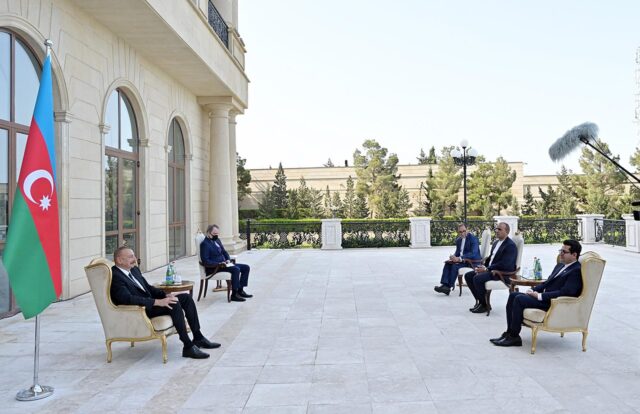
Geopolitical Report ISSN 2785-2598 Volume 30 Issue 3
Author: Silvia Boltuc
The recent ‘diplomatic crisis’ between Iran and Azerbaijan, which has involved the Iranian diplomatic staff in Baku, underlined the potential political and military escalation between the countries, whose consequences might hugely influence the security in the South Caucasus.
Iranian Extraordinary and Plenipotentiary Ambassador to Azerbaijan, Seyyed Abbas Mousavi, has been summoned to the Azerbaijani Ministry of Foreign Affairs. Mousavi was notified that four employees of the Iranian Embassy in Baku had been declared persona non-grata for activities which don’t correspond to diplomatic status and ordered to leave the country within 48 hours. This follows the recent arrests of six people, allegedly tied to Iran, who were detained as suspects in the shooting near Baku of Parliamentary member Fazil Mustafa.
In addition, on April 5th, 2023, 210 Iranian lawmakers issued a joint statement to condemn Azerbaijan’s move to open an embassy in Tel Aviv and appoint an ambassador to Israel, further deepening the diplomatic crisis.
Geopolitical scenario
The Iranian Ambassador was summoned several times within a few days. Iranian representatives sent a verbal note on April 3rd, 2023, urging Azerbaijan to take appropriate measures to prevent anti-Iranian broadcasts and articles in the Azerbaijani media.
Indeed, contrary to the past, Azerbaijani media openly recall the need for the northern Iranian region to pass under Azerbaijan’s control based on ethnolinguistic claims. Headlines such as ‘The time has come, southern Azerbaijan must separate from Iran‘ or ‘South Azerbaijan fights for independence! Azerbaijani state has a sufficient mobilisation force to protect the rights of its compatriots’ were published on media platforms affiliated with the presidential administration.
The Azerbaijani Ministry of Foreign Affairs replied with a statement accusing that the misunderstandings arising in Iran-Azerbaijan relations are constantly caused by the unilateral behaviour and steps of the Iranian side and the inadequate reciprocation by Iran of consistent and well-intentioned actions of the Azerbaijani side.
Moreover, on March 29th, 2023, at a press conference held in Israel, Jeyhun Bayramov, Azerbaijan’s Minister of Foreign Affairs, and his Israeli counterpart Eli Cohen declared that Azerbaijan and Israel share threats caused by Iran, accusing Tehran of creating instability in the Middle East by supporting and financing terrorism. Cohen stressed the need to stop Tehran’s nuclear program and act jointly against Iran. The Iranians perceived the joint declaration as a threat to their internal security and a confirmation that Azerbaijan offers ground for possible Israeli military offensives towards the Islamic Republic of Iran.
It should be underlined that Iran has supported the Palestinian resistance under Israeli occupation for decades. In the aftermath of Israeli forces storming into the al-Aqsa Mosque on April 5th, 2023, Muslim countries showed nearness to the Palestinian population.
The opening of the Azerbaijani embassy in Israel was seen by the Iranian side not only as proof of Baku’s closeness to Tel Aviv but moreover as a hostile step towards the Muslim Ummah (the worldwide Muslim community), particularly following Azerbaijan’s recent crackdown on Shia Muslims inside the country.
Why does it matter?
The tension between Baku and Tehran, growing after the 2020 Nagorno-Karabakh Conflict, reached a new level after January 27th, 2023, when an employee of the Azerbaijani embassy in Iran was killed and two injured following an armed attack. Azerbaijan perceived this incident as a terrorist act and a message to Baku for its policies. The evacuation of all embassy employees and their families on January 29th, 2023, further proves that relations between the neighbouring countries were worsening.
Confronting Azerbaijan would not be in Iranian interests right now. However, as the country’s military doctrine is mainly of deterrence, the risk perceived by the Tel Aviv-Baku axis and Azerbaijan’s growing threats towards Iran’s historical ally, Armenia, has pushed Iran towards a more active policy.
The fact that during the 2020 Nagorno-Karabakh Conflict, Iran didn’t side with Armenia but agreed with the passage of the disputed territories under Baku’s control and proposed a mediation format to stop hostilities proved that Tehran tried multiple times to mediate and stabilise the Southern Caucasus.
Although it can be said that Iran’s tried to expand a sort of influence by exporting its ideology, a confrontation with Azerbaijan doesn’t serve Tehran’s regional strategy and interests. Nevertheless, Armenia’s border with Iran, significantly reduced after the 2020 Nagorno-Karabakh Conflict, is highly important for Tehran. On July 2022, Iranian President Ibrahim Raisi received Turkey and Russian Presidents in Tehran and stated that the Islamic Republic of Iran would oppose any policy on closing the border between Iran and Armenia because it is a connection route that has existed for thousands of years.
From a strategic perspective, the Zangezur corridor would not only cut Iran’s connection to Russia and Europe but also cut off Iran from energy corridors. The recent gas swap agreement signed by Azerbaijan, Turkmenistan and Iran was precisely Tehran’s attempt to enter the new energy route toward Europe by sponsoring the Islamic Republic of Iran as a transit country alternative to the Trans-Caspian Pipeline, which clearly would undermine Tehran’s interests. The Zangezur Corridor also serves Ankara’s pan-Turkism ideology by connecting Azerbaijan to Turkey.
Last but not least, considering Baku’s position on the Northern Iranian territories, which Azerbaijani would like to incorporate due to ethnolinguistic aspects, the question is if Baku, following this ideology, would also recognise Donbas to be part of the Russian Federation. In this case, Azerbaijan might face serious consequences with the European Union.



